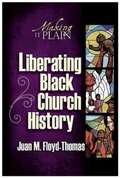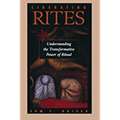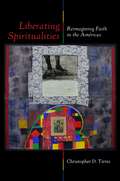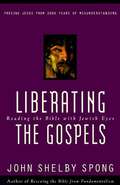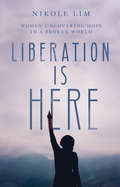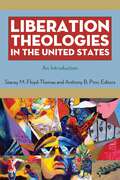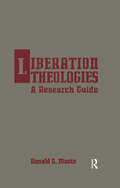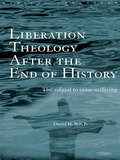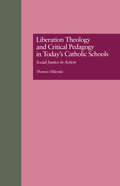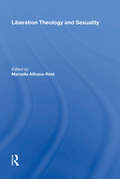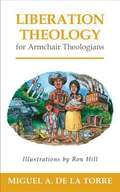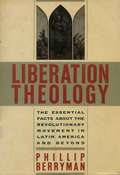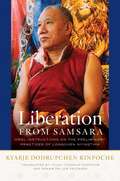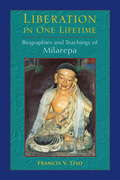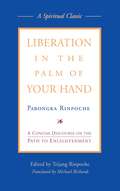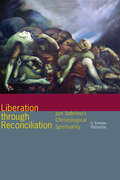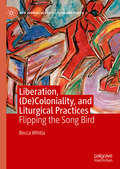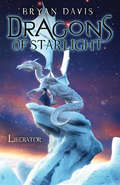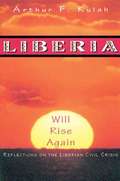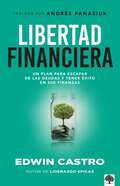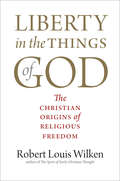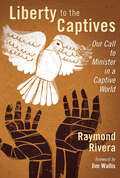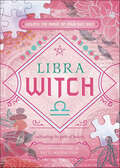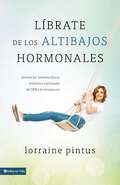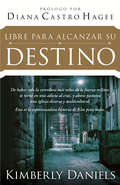- Table View
- List View
Liberating Black Church History: Making It Plain
by Juan M. Floyd-ThomasNo serious scholar in biblical studies today can introduce students to his or her field without taking into account the contributions of African American scholarship. The long traditions of biblical interpretation in the Black Church, and the innovative research and writing performed by African American scholars in recent years are now essential components of a critical study of the Bible.Up to now, knowing how best to introduce the fruits of African American biblical scholarship to students has been difficult. Good resources exist, yet too often they are not written with the needs of introductory students in mind. This book meets that need by providing an overview of the most important developments in African American approaches to biblical scholarship. It offers insight into the particular ways that African American scholarship has shaped the world of biblical study.
Liberating Rites: Understanding the Transformative Power of Ritual
by Tom F. DriverIn Liberating Rites: Understanding the Transformative Power of Ritual, Tom F. Driver illuminates the making of ritual by removing it from its churchly wrappings and presenting it as something raw, basic, and central to all living beings. He examines the varied ways humans use ritual to give order to their lives, to deepen feelings of communal belonging, and to transform the status quo. Driver looks closely at how ritual, viewed as creative performance, is essential to religion and to the movement from bondage to freedom, whether in society or the individual. His analyses use examples drawn from a wide variety of cultures and religions -- Haiti, Korea, South Africa, Judaism, Roman Catholicism, Hinduism, and more, in addition to the author's own North American Protestantism. The result is an accessible and engaging discussion, ideal for introductions to religion, the psychology of religion, the sociology of religion, and studies in ritual and liturgy. Many general readers also will find the book fascinating because it makes explicit so many unspoken feelings about the human longing for rituals that 'work,' combining meaning with power.
Liberating Spiritualities: Reimagining Faith in the Américas
by Christopher D. TirresA new perspective on spirituality and social change as seen through the work of six visionary thinkersIn Liberating Spiritualities, Christopher D. Tirres offers an in-depth exploration of spirituality as a catalyst for social transformation, showcasing the profound insights of six distinguished twentieth-century liberation thinkers from across the Américas. This thought-provoking work examines the contributions of Marxist philosopher José Carlos Mariátegui, renowned educator and philosopher Paulo Freire, innovative constructive theologian Virgilio Elizondo, influential cultural and feminist theorist Gloria Anzaldúa, activist mujerista theologian and social ethicist Ada María Isasi-Díaz, and groundbreaking ecofeminist theologian Ivone Gebara. Tirres examines the distinct yet interconnected philosophies of these figures, showcasing their unified critique of colonial Christendom and their deep commitment to the marginalized. He adeptly articulates how their diverse religious and philosophical backgrounds come together in a shared vision of spirituality as a fundamental aspect of human life and intelligence. He further illuminates how these thinkers advocate for spirituality as a non-reductive, life-affirming practice, transcending traditional boundaries and offering an integrated approach to faith, culture, and social justice. Their collective insights form a persuasive case for re-envisioning spirituality as a crucial element in the quest for a more just and compassionate world.Liberating Spiritualities is not only a tribute to these six influential figures but also a critical reflection on the relevance of their ideas in today’s global context. Tirres’s transdisciplinary study bridges liberationist and pragmatic insights, offering readers a fresh, highly original interpretation of socially engaged spirituality, making this book an essential resource for those seeking to understand the transformative power of spirituality in the pursuit of social justice and human dignity.
Liberating the Gospels: Reading the Bible with Jewish Eyes
by John Shelby SpongIn this boldest book since Rescuing the Bible from Fundamentalism, Bishop John Shelby Spong offers a compelling view of the Gospels as thoroughly Jewish texts. Spong powerfully argues that many of the key Gospel accounts of events in the life of Jesus--from the stories of his birth to his physical resurrection--are not literally true. He offers convincing evidence that the Gospels are a collection of Jewish midrashic stories written to convey the significance of Jesus. This remarkable discovery brings us closer to how Jesus was really understood in his day and should be in ours.
Liberation Is Here: Women Uncovering Hope in a Broken World
by Nikole LimAs a freelance filmmaker, Nikole Lim's career allowed her to step in and out of the lives of marginalized people around the world. But when confronted with the prevalence of sexual violence in Kenyan and Zambian communities, she commits to advocating alongside the courageous survivors whose lives have intersected with hers. These women's powerful stories inspire her to embark on a new vocation, partnering with survivors of sexual violence to launch a nonprofit organization that equips women to lead through the rewritten stories of their lives. But as Lim seeks to help her friends experience healing and liberation, her perspective is altered. Spiritually depleted, she finds herself ministered to by the women she came to serve—the once oppressed become her liberators. Illustrated with dramatic full-color photography from Lim's own camera, Liberation Is Here transports us to forgotten corners of the world. From the slums of Nairobi, hospitals of Lusaka, killing fields of Kigali, and the back alleys of Barcelona, Lim weaves together a narrative of God’s grace and healing amid fear and trauma. Her journey proves that liberation is not just near, but it is here—in the eyes of the broken, the hearts of the oppressed, and the untold stories of our global community.
Liberation Theologies in the United States: An Introduction
by Stacey M Floyd-Thomas Anthony B PinnLiberation Theologies in the United States reveals how the critical use of religion can be utilized to challenge and combat oppression in America. In the nascent United States, religion often functioned as a justifier of oppression. Yet while religious discourse buttressed such oppressive activities as slavery and the destruction of native populations, oppressed communities have also made use of religion to critique and challenge this abuse. As Liberation Theologies in the United States demonstrates, this critical use of religion has often taken the form of liberation theologies, which use primarily Christian principles to address questions of social justice, including racism, poverty, and other types of oppression. Stacey M. Floyd-Thomas and Anthony B. Pinn have brought together a stellar group of liberation theology scholars to provide a synthetic introduction to the historical development, context, theory, and goals of a range of U.S.-born liberation theologies: Black Theology—Anthony B. Pinn Womanist Theology—Stacey M. Floyd-Thomas Latina Theology—Nancy Pineda-Madrid Hispanic/Latino(a) Theology—Benjamín Valentín Asian American Theology—Andrew Sung Park Asian American Feminist Theology—Grace Ji-Sun Kim Native Feminist Theology—Andrea Smith Native American Theology—George (Tink) Tinker Gay and Lesbian Theology—Robert E. Shore-Goss Feminist Theology—Mary McClintock Fulkerson &“An extraordinary resource for understanding the vitality of liberation theologies and their relation to social transformation in the changing U.S. context. Written in an accessible and engaged way, this powerful and informative text will inspire beginners and scholars alike. I highly recommend it."—Kwok Pui-lan, author of Postcolonial Imagination and Feminist Theology &“A delight to read . . . [and] an exemplary account of the genre of liberation theologies." ―Religious Studies Review
Liberation Theologies: A Research Guide
by Ronald G. MustoFirst Published in 1991. The following is a comprehensive scholarly bibliography of published materials on the varieties of liberation theology, mostly in book form, available in English. It is intended as an introductory survey to this vast and quickly expanding field for the teacher and student of contemporary theology, of biblical hermeneutics, and to the interrelationship of politics and religion around the world. It will also serve as a comprehensive bibliography.
Liberation Theology after the End of History: The refusal to cease suffering (Routledge Radical Orthodoxy)
by Daniel BellDaniel Bell assesses the impact of Christian resistance to capitalism in Latin America, and the implications of theological debates that have emerged from this. He uses postmodern critical theory to investigate capitalism, its effect upon human desire and the Church's response to it, in a thorough account of the rise, failure and future prospects of Latin American liberation theology.
Liberation Theology and Critical Pedagogy in Today's Catholic Schools: Social Justice in Action (Critical Education Practice #Vol. 11)
by Thomas OldenskiGrounded in the work of liberation theologians, this book considers peace, love and social justice within a democratic curriculum and underscores the importance of integrating critical discourses with Catholic education.
Liberation Theology and Sexuality (Reclaiming Liberation Theology Ser.)
by Marcella Althaus-ReidLiberation Theology and Sexuality is a book about 'doing Liberation Theology in Latin America' in the twenty-first century. The style of doing theology remains the same, but this book reflects the work of a new generation of liberation theologians developing a theology that offers a wider and more complex critique of reality, with new perspectives on issues of sexuality, race, gender, culture, globalization and new forms of popular religiosity. Liberation Theology and Sexuality shows how Christianity in Latin America needs to take into account issues concerning sexuality and poverty, together with traditional religiosity and culture when reflecting on the construction of Christian faith and identity in the continent. For the first time, Liberation Theology and Sexuality presents a unique combination of Latin American theologians from more than one generation, reflecting on depth on these issues.
Liberation Theology for Armchair Theologians
by Miguel A. De La TorreIn this helpful addition to the Armchair Theologians series, Miguel A. De La Torre provides a concise overview of the global religious movement known as liberation theology that focuses on defining the major themes of this movement, as well as dispelling some common misconceptions. Liberation theology attempts to reflect upon the divine as understood from the poor, the marginalized, and the disenfranchised. The key figures, historical developments, and interfaith manifestations are all explored in this thorough introduction. Expertly written by De La Torre and accompanied by Ron Hill's illustrations, this book will serve as a primary text for those who may have little knowledge of or have never heard of liberation theology.
Liberation Theology: Essential Facts about the Revolutionary Movement in Latin America--and Beyond
by Phillip BerrymanIn the chaos that is Latin American politics, what role does the Catholic church play with regard to its clergy and its members? How does the church function in Latin America on an everyday, practical level? And how successful has the church been intervening in political matters despite the fact that Latin American countries are essentially Catholic nations? Philip Berryman addresses these timely and challenging issues in this comprehensive. Unlike journalistic accounts, which all too frequently portray liberation theology as an exotic brew of Marxism and Christianity or as a movement of rebel priests bent on challenging church authority, this book aims to get beyond these cliches, to explain exactly what liberation theology is, how it arose, how it works in practice, and its implications. The book also examines how liberation theology functions at the village or barrio level, the political impact of liberation theology, and the major objections to it posed by critics, concluding with a tentative assessment of the future of liberation theology. Author note: Phillip Berryman was a pastoral worker in a barrio in Panama during 1965-73. From 1976 to 1980, he served as a representative for the American Friends Service Committee in Central America. In 1980, he returned from Guatemala to the United States and now lives in Philadelphia.
Liberation from Samsara: Oral Instructions on the Preliminary Practices of Longchen Nyingthik
by Kyabjé Dodrupchen RinpochéIn Liberation from Samsara, the Fourth Kyabjé Dodrupchen Rinpoché presents the Longchen Nyingthik preliminary teachings, with a special focus on guru yoga. These teachings, from the innermost secret instruction of Dzogchen, constitute a complete path to enlightenment. Rinpoché&’s precious instruction begins with meditations on the common and uncommon preliminary practices, including the difficulty of obtaining a fortunate human birth; the impermanence of life; the implacability of karmic causes and results; samsaric suffering in the six realms; taking refuge; developing bodhichitta; purification by Vajrasattva recitation; and accumulating merits by mandala offerings. After discussing the ways to turn our mind toward Dharma and the trainings, Rinpoché provides guru yoga instruction as he turns to the main tantric practice: meditations on unifying one&’s mind with Guru Rinpoché&’s wisdom mind. This rare teaching by Rinpoché, though intentionally succinct to accommodate the needs of contemporary Western practitioners, presents a complete path to enlightenment. It contrasts three different paths to liberation: Shravakayana (the way of the disciple), Pratyekabuddhayana (the way of the self-enlightened buddha), and Mahayana (the way of the bodhisattva), which is our way, our boundless intention to seek refuge in order to free all sentient beings from samsaric suffering.
Liberation in One Lifetime
by Francis V. TisoMilarepa (1052-1135), a major figure in the history of the Kagyu school of Tibetan Buddhism and known as one of Tibet's greatest lamas and poets, continues to inspire Buddhist practitioners worldwide to the present day. Liberation in One Lifetime explores the history and spirituality of the Kagyu lineage in relationship to the narratives and teachings attributed to Milarepa by studying some of the earliest versions of these materials. Offering a detailed analysis of the biographical material that has been written about Milarepa (who was also a student of Marpa, a major figure in the development of the Bka'-brgyud-pa school of Tibetan Buddhism), author, theologian, and well-respected Tibetan Buddhist scholar, Francis V. Tiso, describes the historical context of the tradition of hagiography (biography) in Buddhism and other spiritual traditions, and provides a history of Milarepa's influence in Tibet. Part One explains the tradition of composing stories about Milarepa's life and teachings (there have been many throughout the centuries) and includes outlines of the contents of some of them as well as an explanation of the oral versions that have been transmitted via oral epic songs and poems that Milarepa composed. Describing the spiritual components of Bka'-brgyud-pa, Part Two includes tantric practices, an outline for the path of liberation, definitions of "voidness," and the characteristics of fully enlightened Buddhahood. Part Three includes translated biographies and oral teachings of Milarepa (in poetic form) that are considered sacred texts. The book also includes a foreword by Roberto Vitali, a prominent Tibetan Buddhist scholar as well as an extensive bibliography of primary and secondary sources.
Liberation in the Palm of Your Hand: A Concise Discourse on the Path to Enlightenment (Tibetan Buddhism Ser.)
by Michael Richards Trijang Rinpoche Pabongka RinpochePabongka Rinpoche was one the twentieth century's most charismatic and revered Tibetan lamas, and in Liberation in the Palm of Your Hand we can see why. In this famous twenty-four-day teaching on the lamrim, or stages of the path, Pabongka Rinpoche weaves together lively stories and quotations with frank observations and practical advice to move readers step by step along the journey to buddhahood. When his student Trijang Rinpoche first edited and published these teachings in Tibetan, an instant classic was born. The flavor and immediacy of the original Tibetan are preserved in Michael Richards' fluid and lively translation, which is now substantially revised in this new edition.
Liberation through Reconciliation: Jon Sobrino's Christological Spirituality
by O. Ernesto ValienteIn the past one hundred years alone, more than 200 million people have been killed as a consequence of systematic repression, political revolutions, or ethnic or religious war. The legacy of such violence lingers long after the immediate conflict. Drawing on the author’s experiences of his native El Salvador, Liberation through Reconciliation builds on Jon Sobrino’s thought to construct a Christian spirituality and theology of reconciliation that overcomes conflict by attending to the demands of truth, justice, and forgiveness.
Liberation,: Flipping the Song Bird (New Approaches to Religion and Power)
by Becca WhitlaBecca Whitla uses liberationist, postcolonial, and decolonial methods to analyze hymns, congregational singing, and song-leading practices. By way of this analysis, Whitla shows how congregational singing can embody liberating liturgy and theology. Through a series of interwoven theoretical lenses and methodological tools—including coloniality, mimicry, epistemic disobedience, hybridity, border thinking, and ethnomusicology—the author examines and interrogates a range of factors in the musical sphere. From beloved Victorian hymns to infectious Latin American coritos; congregational singing to radical union choirs; Christian complicity in coloniality to Indigenous ways of knowing, the dynamic praxis-based stance of the book is rooted in the author’s lived experiences and commitments and engages with detailed examples from sacred music and both liturgical and practical theology. Drawing on what she calls a syncopated liberating praxis, the author affirms the intercultural promise of communities of faith as a locus theologicus and a place for the in-breaking of the Holy Spirit.
Liberator
by Bryan DavisFor years, tales of DRAGONS from another world kidnapping and enslaving humans have been circulating in Jason Masters’ world, while for a slave girl named Koren, the stories of a human world seem pure myth. Together, these two teens will need to bridge two planets in order to overthrow the draconic threat and bring the lost slaves home. The Time Has Come As the long-awaited invasion of human forces looms, Jason, Koren, and Elyssa struggle to alert the soldiers to an unforeseen menace on the planet of Starlight—a deadly illness that already has Koren in its grip. Starlighter Cassabrie harbors a secret she believes can counter the dragon king Taushin’s latest maneuverings, but she can disclose little of her risky plan. As Cassabrie fights to save her people, the dragon Magnar works to move the Starlight prophecy in his favor. His actions could make the plight of humans even more perilous. Wishing only to free the slaves and bring peace, a few young warriors are poised to face three armies as they battle for control of two worlds. Can love, faith, and courage be enough? Will Cassabrie be humanity’s last hope?
Liberia Will Rise Again: Reflections on the Liberian Civil Crisis
by Arthur KulahFor seven years, Liberia was involved in a civil war that cost the lives of more than 200,000 people. That war ended on January 31, 1997. Liberia Will Rise Again outlines the causes of the war, interprets the present situation, and offers suggestions for the future. KEY BENEFITS: * Provides a better understanding of the civil war in Liberia * Shows how the Liberians may have contributed to the problem * Helps readers learn about the treatment of refugees * Discusses issues related to the civil war and suggests lessons to be learned from the bitter experience
Libertad financiera: Un plan para escapar de las deudas y tener éxito en sus finanzas (Ruta Hacia La Libertad Financiera Ser.)
by Edwin CastroNO ESPERE. Tome la decisión hoy mismo. Dígale “¡NO!”, al endeudamiento y “¡SI!”, a la libertad FINANCIERA. Aquí encontrará instrucción fundamental sobre el sabio manejo de sus finanzas. Porque estar informado y tomar las decisiones adecuadas lo libera de la deuda, la pobreza y la escasez. Además, sepa que no importa la circunstancia retadora en la que se encuentre habitualmente hay esperanza.
Liberty in the Things of God: The Christian Origins of Religious Freedom
by Robert Louis WilkenFrom one of the leading historians of Christianity comes this sweeping reassessment of religious freedom, from the church fathers to John Locke In the ancient world Christian apologists wrote in defense of their right to practice their faith in the cities of the Roman Empire. They argued that religious faith is an inward disposition of the mind and heart and cannot be coerced by external force, laying a foundation on which later generations would build. Chronicling the history of the struggle for religious freedom from the early Christian movement through the seventeenth century, Robert Louis Wilken shows that the origins of religious freedom and liberty of conscience are religious, not political, in origin. They took form before the Enlightenment through the labors of men and women of faith who believed there could be no justice in society without liberty in the things of God. This provocative book, drawing on writings from the early Church as well as the sixteenth and seventeenth centuries, reminds us of how “the meditations of the past were fitted to affairs of a later day.”
Liberty to the Captives: Our Call to Minister in a Captive World
by Raymond RiveraLiberty to the Captives is a book for any Christians who want to learn how to bring hope and redemption to their communities — for those who are ready to step beyond their comfort zone, leave the status quo behind, and take up Christ's call to minister within a world crying out for the freedom only God can bring. Longtime pastor Raymond Rivera's testimony of a life completely turned around — from gang member to RCA pastor — underscores his powerful message.Full of practical advice about how holistic community-based ministry can bring transformation, healing, and liberation from captivity, Liberty to the Captives encourages Christians to respond to God's call by ministering wherever God has placed them. Based on over forty-five years of pastoring inner-city churches, Rivera's inspiring vision challenges all Christians to think again about how their faith should lead to social action and defense of society's most vulnerable people.
Libra Witch: Unlock the Magic of Your Sun Sign (The Witch's Sun Sign Series)
by Patti Wigington Ivo Dominguez Jr.Witchcraft to Celebrate Your Charming & Artistic SelfEnhance your magical practice and personal development with the power of your Libra Sun sign. Ivo Dominguez, Jr. and Patti Wigington share what strengths and challenges your sign brings to both witchcraft and everyday life. Featuring recipes, exercises, stories, rituals, and spells from the authors and a host of Libra contributors, this book teaches you how to best connect with your sign's energy, manage your power, cleanse and shield yourself, tailor-fit magical workings to your sign, and more.Contributors to this volume:Emma Kathryn • Kelden • Tomás Prower • Angela Raincatcher • Astrea Taylor • Manny Tejeda y Moreno • Dawn Aurora Hunt • Sandra Kynes
Librate de los altibajos hormonales: Domina los síntomas fiscos, mentales y espirituales del SPM y la menopausia
by Lorraine PintusLos momentos de comprensión física, mental y espiritual de Lorraine te impulsarán a pasar de ser una creyente débil a ser una gran adoradora. Aprende cuáles son los diez beneficios (¡si, diez!) que traen consigo el síndrome premenstrual y la perimenopausia. Descubre las estrategias y recibe la ayuda práctica de una mujer «que ha pasado por todo eso», y de las mil quinientas y tantas que ella entrevistó.
Libre Para Alcanzar Su Destino: De haber sido la corredora más veloz de la fuerza militar, se tornó en una adicta al crack, y ahora pastorea una iglesia diversa y multicultural.
by Kimberly Daniels"Si usted tiene un "diablo" problema, necesita una "Cristo" respuesta!", esta es una expresión que, a menudo, Kimerly Daniels le dice a la gente. Es un tema que la autora conoce en su propia experiencia. Usted tendrá que ponerse el cinturón mientras se adentra en el mundo de esta mujer, cuya vida se lee como un guión de cine. De practicar la brujería a ser una atleta profesional, caer en la drogadicción y, finalmente, ser una pastora y conferencista internacional, Daniels ha sido Libre para alcanzar un destino que va mucho más allá de sus sueñosy expectativas. Su extraordinaria autobiografía se relaciona con cada sendero de la vida, y toda persona podrá identificarse con su historia, donde las víctimas se convierten en conquistadores y los oprimidos se convierten en vencedores. Usted podrá entender a profundidad cómo Daniels ha desarrollado una entrañable pasión por los perdidos y el deso de que las personas experimenten más que una liberación. Mientras usted lee esta historia cautivante sobre "salir" de la esclavitud, descubrirá el principio de "entrar" hacia lo que Dios desea para usted.
